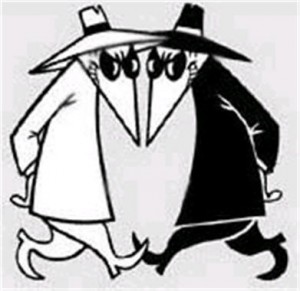The man in the cloak hands me a small piece of blue paper with an unidentified scribble on it filled with code names and numbers. “Quick,” he says, “ go give this to the man in the little window in the corner store on 102nd and Broadway and wait for further instructions,” says the cloaked man and sends me on my way. Without looking at the note, I fold it twice and place it in my back pocket and hurry over to the drop-off location.
I enter discreetly into the dimly lit store and look around me. “If I hurry, I can make it to the small window without getting noticed,” I think to myself, and hurry down the aisle. “Can I help you?” says an unfriendly and tired looking face from behind the small widow. Without thinking twice I hand him the small folded piece of paper with the secret code. “Hmm,” says the man. “Come back in twenty minutes, and don’t be late!”
I run off, and hide on a bench around the corner, I feel faint, hot and lightheaded, worrying and thinking about the outcome of this drop off. Twenty minutes later, I am standing again in front of the man, sweating and shaking. The man hands me a small vial and whispers to me: “Take three drops of this twice a day for week.” I take the vial from his hand, and garner the courage to ask the frightening man “and the note I gave you? What did it say?”
“That is not your concern,” says the man, as he shuts the small window door.
I walk off silently and ponder this whole clandestine transaction I involved myself in. “Is there another way?” I ask.
Stephen Wilkins, MPH, the Author of the blog Mind the Gap states that research has shown that “36% of patients did not know the name of the medication they were given, 36% of patients did not know what the new medication was supposed to do, and 44% did not know the proper dosage instructions for the new medication.”
These are amazing findings, on their own, but this points to another problem, one that is in the process of filling the script in the first place. We do not know what is written on the “small piece of blue paper with a unidentified scribble” and do not get a copy of it back from the pharmacist, so we do not know whether it was filled correctly.
Three months ago, after having corrective eye surgery, I filled a script for glasses with a prism. I am still suffering from double vision, and these glasses were meant to help me see one picture. My doctor took the time to explain to me the purpose of the prism glasses. The prism was to be placed on the right lens and allow the two pictures I am seeing to be fused into one. The script said the following: “OD, PLANO, sph, 2.0 Up and 4.0 Out”. After waiting two weeks to the script to be filled, I excitedly took the glasses home for a test run. I put them on my head and watched a TV show, trying all the time to fuse the pictures together. After no success, I took the glasses off for a closer look. To my surprise, the prism lens was placed on my left lens, and not the right. Confused, I referenced the copy I made of the script before filling it (yes, I do that!). I entered “OD, PLANO, sph, 2.0 Up and 4.0 Out” into Google, and came up with the Wikipedia entry explaining it. I was not crazy, they incorrectly filled the script placing the lens on the wrong eye. I wonder how often this happens with eye glasses.
A similar mistake happened to me a month ago when I filled a new drug script at Duane Read. I was filling a drug that required me to take 5MG twice a day. When getting my prescription back I looked at the dosage which said 10MG twice a way. Not only was this twice the dosage I was prescribed, but it would have at the very least caused me serious side effects. I asked the pharmacist to look up my script again to see if this was a mistake, and of course it was. “Come back in twenty minutes,” I was told and they fixed the mistake.
I wonder, how often this happens, and why we let the pharmacist and the physicians hold all the cards. Why don’t we demand a clear explanation of the drugs we are given, and a copy of the script for our records? Anyone who knows me knows that I am a very experienced health consumer. I have to be after all these years. I also happen to have a Masters in Health Policy and Management from Columbia University. I am also kind of obsessed with pharmacies (mostly Rite Aid). So it comes as no surprise that I am capable of catching most of the mistakes that arise from this unfair asymmetric information system of filling prescriptions.
But what about the rest of the world, what about you?


Leave a Reply
You must be logged in to post a comment.